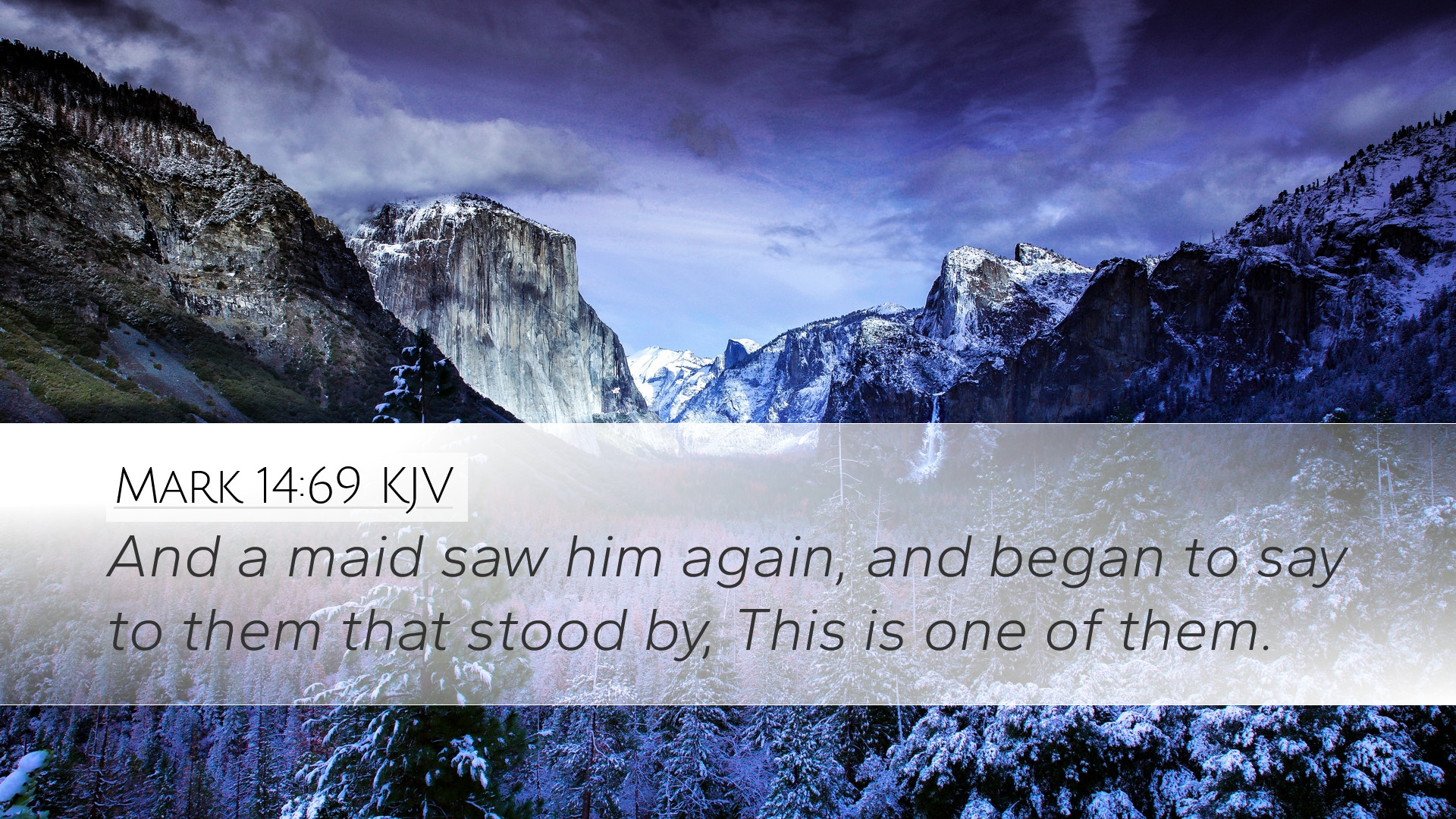Commentary on Mark 14:69
Mark 14:69 captures a pivotal moment in the life of Peter, serving as a stark reminder of human frailty in the face of trial. In this verse, Peter is recognized for the second time as a follower of Jesus, revealing his fear and self-preservation during a critical juncture. Below, we explore insights from public domain commentaries to provide a comprehensive understanding of this significant passage.
Overview of the Context
Mark 14 narrates the events surrounding the arrest of Jesus. Following the Last Supper and the institution of the Lord's Supper, Jesus is betrayed by Judas. The heat of the narrative escalates as Peter, a staunch disciple, finds himself in a precarious position—not within the safety of Christ's inner circle but at a distance as Jesus faces scrutiny before the Sanhedrin.
The Significance of the Recognition
As Peter is confronted by a servant girl who recognizes him as a disciple of Jesus, this moment encapsulates the conflict of faith and fear. As Matthew Henry notes, “Peter’s denial of Christ is a warning against the fear of man, which is a snare.” The girl’s inquiry signifies the unexpected trials that believers encounter, often in contexts where they least expect it.
Peter’s Response
Peter's immediate reaction is to deny knowing Jesus, emphasizing the instinctual nature of self-preservation during times of fear. Adam Clarke highlights that Peter's denial stems from both the pressure of the moment and an attempt to protect himself from potential repercussions. He writes, “Fear often produces disloyalty and cowardice, even in those who have professed the strongest allegiance.”
The Role of the Servant Girl
The servant girl serves not only as an accuser but as a personification of the societal pressure faced by disciples. Albert Barnes expresses that her recognition “epitomizes the challenge believers often face in standing firm in their faith amidst external scrutiny.” This simple yet significant confrontation leads Peter into deeper internal conflict.
Comparison to Other Denials
In examining Peter's denial, it is instructive to compare it to other scriptural instances of denial and abandonment. The Gospels narrate this event to illustrate the universal vulnerability of even the strongest believers. Matthew Henry comments that Peter's subsequent repentance and restoration serve as a hopeful reminder that failure does not have to be final.
Theological Implications
- Human Vulnerability: Mark 14:69 highlights the frailty of humanity in the face of trials, reminding us that even dedicated followers of Christ may falter.
- Grace and Redemption: This event points towards the redemptive work of Christ. Following his denial, Peter transforms from a source of shame to a pillar of the early Church, showcasing God's grace.
- Courage in Faith: The chapter challenges believers to foster courage and conviction in their faith, especially when confronted with opposition.
Practical Applications for Believers
In light of Mark 14:69, believers are urged to reflect on their own faithfulness amidst trials. The following applications can be drawn:
- Courage Under Fire: Seek to cultivate a steadfast faith that does not waver in the face of societal pressure or personal risk.
- Community Support: Surround yourself with a community that encourages and strengthens faith, rather than succumbing to fear.
- Embrace Forgiveness: Recognize that, like Peter, we all stumble. The path of faith includes both acknowledgment of failure and the embrace of forgiveness.
Conclusion
Mark 14:69 offers profound insights into human nature, faith, and the process of restoration. The intertwining themes of denial and redemption positioned within this passage serve as critical reminders for pastors, students, theologians, and scholars as they seek to embody their faith amidst the inevitable trials of life. We can take heart in the promise that our failures, like Peter's, do not define our identity as children of God. Instead, they can be tuned into powerful testimonies of grace if we return to Christ seeking renewal.


